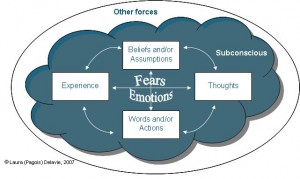I just read a short article by Marilyn Schlitz, PhD, titled Why We Can Be Dogmatically Against Things We Know Nothing About in the newest issue of Spirituality & Health (March – April 2010). A few things grabbed my attention. First, Ms. Schlitz writes:
“new discoveries in neuroscience, social psychology, and anthropology offer provocative insights into the barriers of transformation. They show us that our views of reality are embedded largely in our unconscious mind. Operating below the threshold of our conscious awareness, our beliefs and assumptions shape our experience… (p. 39)”
Her comments support the idea that beliefs and assumptions drive our behavior and that we often are unaware of those driving forces. They also align with the Theoretical Elements of Behavior model I created in 2006 and modified in 2007.
Ms. Schlitz comments, “the data calls for humility to question our deepest assumptions” (p. 40). Through reflection, meditation and/or energetic work, hidden aspects of the personal subconscious can become known, allowing us to change our beliefs and assumptions and thus modify our thoughts, fears, emotions, words, actions and our experiences.
Behavior change is difficult without understanding our underlying beliefs and assumptions. Something in those underlying beliefs and assumptions holds us back from moving forward in change. When we uncover what is holding us back, we can make new choices about what to belief, assume, think and do and thus overcome the resistance to change.
When talking with clients about culture change, a crucial component is discussing the underlying beliefs and assumptions that drive current cultural behaviors as well as the beliefs and assumptions that will be needed for a cultural shift. Unless the beliefs and assumptions held by members of the organization are addressed, you will likely be left with behavioral shifts that are only temporary or have unknown or undesirable consequences.
Ms. Schlitz also writes that “experiments reveal a truth about human nature: belief blinds us to alternative points of view and can even lead to dogmatic assertions about things we know nothing about” (p. 40). The impact that dogmatic belief can have on ideation is that we judge ideas too early – including our own. We negate what is outside of our belief system as not possible. The realm of the new and different requires us to ask the questions: “What if…?” and “What else…?” in order to continually question and challenge us to go beyond what fits with our current beliefs. Yet, even so, until we reflect upon and challenge underlying beliefs and assumptions, we still may not see what is possible.
To move beyond what is not only requires an open mind and willingness to question, it requires that we question and reflect upon the underlying beliefs and assumptions that drive our behavior. To scratch the surface of only looking at action leaves us vulnerable to temporary or superficial change. It leaves us vulnerable to only accepting the idea that best fits with how we think things are or should be instead of how they could be.
Go deep. Question. Reflect. Challenge. Shift.
3 Responses to “Beliefs blind us to alternatives – impact on change and ideation”


An interesting discussion is worth comment. I think that you should write more on this topic, it might not be a taboo subject but generally people are not enough to speak on such topics. To the next. Cheers
I appreciate your comment. I am currently reading the Biology of Belief by Bruce Lipton, Ph.D. One example of how dogma has prevented people from alternative points of view is when scientists discounted French biologist Jean-Baptiste de Lamarck’s theory of evolution and chose to support and believe in Darwin’s theory of survival of the fittest. Lamarcks’ theory suggested more cooperation and interaction between organisms and with their environment allowing life forms to “survive and evolve in a dynamic world” (p.11). Dr. Lipton speaks to how Lamarck’s theory, which, by the way, was presented 50 years before Darwin’s, aligns with “modern cell biologists’ understanding of how immune systems adapt to their environment” (p.11). Further, scientists today are re-looking at Lamarck’s ideas especially as they relate to cooperation and symbiosis in nature.
As I read this book, I am often drawn to the implications for business and teams. How often do organizations emphasize the Darwinian “survival of the fittest” when perhaps we need to shift to a more Lamarckian cooperation and interaction with others and our environment to survive and evolve in the dynamic and complex world?
Interestingly, one of my favorite quotes attributed to Darwin is “It is not the strongest who survive but those who are most adaptable.” I wonder now if there might have been some “telephone” game going on and the wires between Darwin and Lamarck were crossed in how this quote was passed on…
Regardless, I am fascinated by the book so far and look forward to learning more about the biology of belief and the implications for healthy people, healthy organizations and a healthy world.
Hello! I just would like to give a huge thumbs up for the great info you have here on this post. I will be coming back to your blog for more soon.